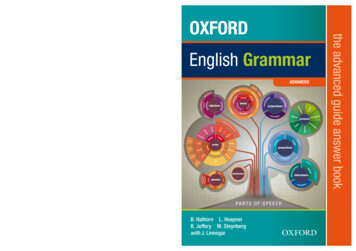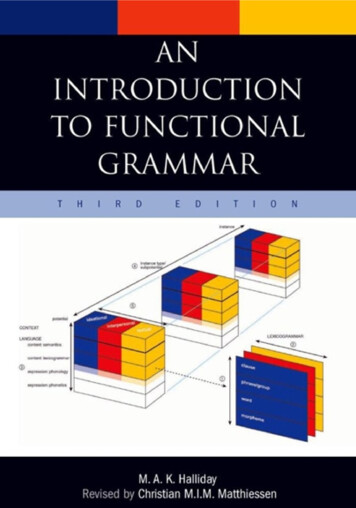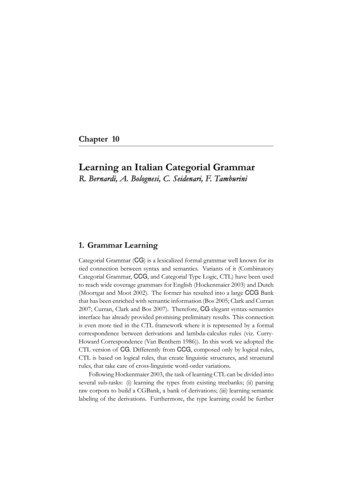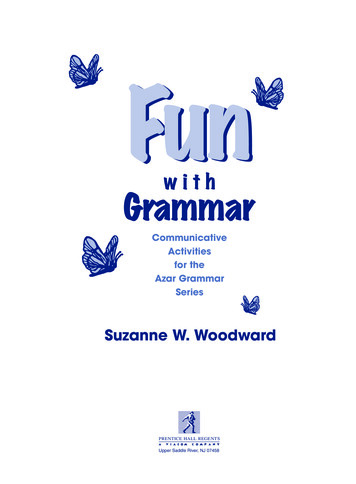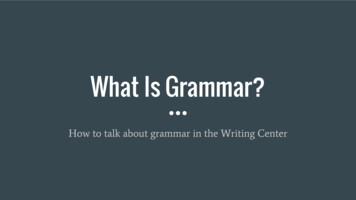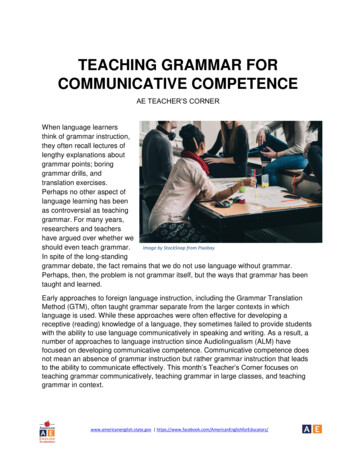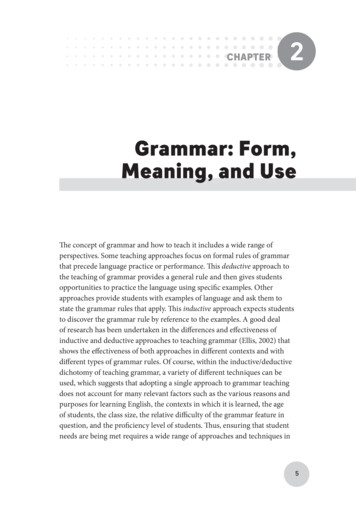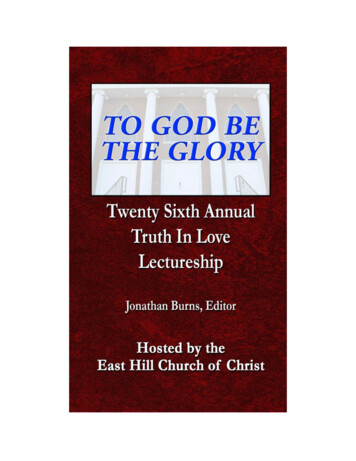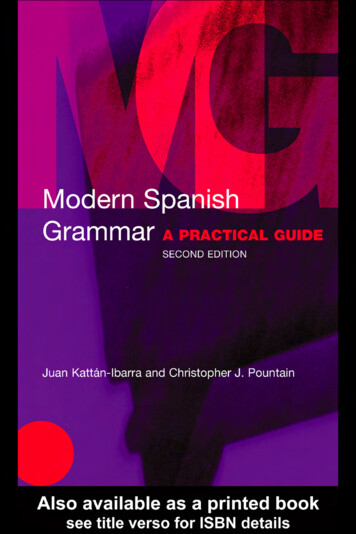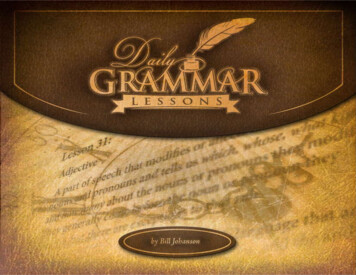
Transcription
-1-
Table of ContentsSection 1: Parts of Speech . 3Section 3: Mechanics. 339Chapter 1: Verbs . 5Chapter 2: Nouns. 17Chapter 3: Pronouns . 21Chapter 4: Adjectives . 31Chapter 5: Adverbs. 45Chapter 6: Prepositions, Conjuctions, & Interjections . 65Chapter 7: Parts of Speech Review . 79Chapter 31: Capitalization . 341Chapter 32: End Punctuation . 365Chapter 33: Periods . 369Chapter 34: Commas . 375Chapter 35: Quotation Marks . 399Chapter 36: Semicolons . 409Chapter 37: Colons . 415Chapter 38: Italics & Underlining . 423Chapter 39: Apostrophes . 427Chapter 40: Hyphens . 439Chapter 41: Dashes . 447Chapter 42: Parentheses . 451Chapter 43: Brackets & Slashes . 455Section 2: Parts of the Sentence . 85Chapter 8: Subjects and Verbs . 87Chapter 9: Predicate Nominatives . 97Chapter 10: Direct Objects . 105Chapter 11: Review of Subjects and Verbs, Predicate Nominatives,and Direct Objects . 113Chapter 12: Transitive and Intransitive Verbs . 119Chapter 13: Appositives . 133Chapter 14: Nouns of Address . 139Chapter 15: Pronouns Revisited . 145Chapter 16: Noun/Pronoun Review . 159Chapter 17: Adjectives Revisited . 167Chapter 18: Adverbs Revisited . 179Chapter 19: Prepositional Phrases . 195Chapter 20: Indirect Objects . 209Chapter 21: Objective Complements . 215Chapter 22: Conjunctions Revisited . 219Chapter 23: Verbals . 227Chapter 24: Compound Sentences . 267Chapter 25: Adjective Clauses . 275Chapter 26: Adverb Clauses . 287Chapter 27: Noun Clauses . 299Chapter 28: Clauses Review . 303Chapter 29: Sentence Variety . 317Chapter 30: Compound Sentences . 325Glossary . 459Index . 467-1-
-2-
Section 1: Parts of Speech-3-
-4-
Chapter 1: VerbsVerbs show action or state of being.Lesson 1Lesson 2Verbs are the most important words in a sentence. Verbs are the firstof the eight parts of speech that we will be studying. Most verbs areaction words, but a few verbs indicate state of being or existence.The first lessons will be about verbs, and how they are recognizedand used.Instructions: Find the state of being verbs in these sentences.Instructions: Find the action verbs in the following sentences.3. You seem upset.1. My uncle is a pilot.2. The pie looks good.1. The wolf ran across the sand.2. Sit down.3. The dog barked at the man.Answers:1. is2. looks3. seemThese verbs are state of being or linking verbs. Some commonlinking verbs include: is, am, are, was, were, be, being, been, seem,look, feel, and become. They do not show action; they just show thatsomething exists.Answers:1. ran2. sit3. barkedAll three verbs are action verbs since they show action. Action verbsare the most common verbs.-5-
Lesson 3Lesson 4Instructions: Pick out the verbs in these sentences and tell whetherthey are action verbs or linking verbs.Sometimes a verb can be more than one word. When a verb is morethan one word, it is called a verb phrase. Verb phrases can be two,three, or four words. Using auxiliary or helping verbs makes verbphrases. There are twenty-three (23) helping verbs that should bememorized since they are used so often. If you memorize them, itwill make knowing and understanding verbs much easier. They areusually grouped in the following five groups:1. Suddenly someone sneezed loudly.2. There are holes in my shirt.3. He appears happy.Group 1: is, am, are, was, were, be, being, beenGroup 2: has, have, hadGroup 3: do, does, didGroup 4: shall, will, should, wouldGroup 5: may, might, must, can, could4. The image appeared in the mirror.Instructions: Pick out the verb phrases in these sentences.1. You are going to Seattle.2. You have been resting too much.3. We must be early.4. I will be finished shortly.Answers:1. sneezed2. are3. appears4. appearedSneezed and appeared are action verbs. Are and appears are linking,or state of being verbs. Some verbs, like appear, can be either actionor linking verbs (this depends on whether the verb shows action ornot). In the sentence above, appears is like saying seems, whichshows no action. However, appeared shows the action of the image.Answers:1. are going2. have been resting3. must be4. will be finishedThese sentences all have what are called auxiliary or helping verbs. Iwill refer to them as helping verbs.-6-
Lesson 5Quiz for Lessons 1 - 5Some of the helping verbs can be used alone as the main verb. Is, am,are, was, and were can be used alone as linking or state of beingverbs. Has, have, had, do, does, and did always show action whenused alone. Be, being, and been can be used with other verbs either toshow action, or state of being. The other helping verbs cannot beused alone, but only as helping verbs.Instructions: List the verbs or verb phrases in the sentences, and tellwhether they are action verbs or state of being verbs. For extra credit,find the helping verbs.1. Jim plays basketball.2. They will return on the airplane.Instructions: Find the verb or verb phrases in these sentences.3. Badger is a funny dog.1. She has too many friends.4. I have been here a long time.2. You do beautiful work.5. I should have been playing the drum.3. I was in Canada last week.6. Go home.4. You are being very stubborn.Answers:1. has2. do3. was4. are beingHas and do are action verbs, was and are being are state of beingverbs.-7-
Answers for Quiz (Lessons 1-5):Lesson 61. plays - actionInstructions: Pick out the verb phrases in the following sentences(remember to watch for the helping verbs).2. will return - action1. I can understand his concern.3. is - linking or state of being2. She must have told you ten times.4. have been - state of being3. We shall go tomorrow.5. should have been playing - action4. The wind was howling all night.6. go - actionThe helping verbs are: will, have, should, have, and been. The beenin sentence four is not a helping verb because it is the main verb. Thelast verb in a verb phrase is always the main verb.Answers:1. can understand2. must have told3. shall go4. was howlingCan understand, must have told, shall go, and was howling are theverb phrases.-8-
Lesson 7Lesson 8The use of helping verbs causes certain changes in verb phrases thatwe need to be able to recognize. One change is the use ofcontractions (contractions are two or more words combined togetherwith an apostrophe).A helping verb may be connected with another word in a contractedform. The following sentences have verb phrases using contractions.Instructions: Find the verb phrases in each sentence. Determine ifthe verb phases are action verbs or state of being verbs.As mentioned before, it’s a good idea to memorize the helping verbs.If you haven’t memorized them, take a few minutes to learn them.1. I've done it again.Group 1: is, am, are, was, were, be, being, beenGroup 2: has, have, hadGroup 3: do, does, didGroup 4: shall, will, should, wouldGroup 5: may, might, must, can, could2. You aren't going with us.3. She's staying to tend the kids.Instructions: List the contractions in the following sentences.1. I've done it again.2. You aren't going with us.3. She's staying to tend the kids.Answers:1. 've (have) done - Have is in contracted form.2. are going - Are is connected to the contracted form of not.3. 's (is) staying - Is is in contracted form.All three verb phrases are action verbs.Answers:1. I’ve2. aren’t3. she’s-9-
Lesson 9Lesson 10In sentences that are questions, the verb phrase is often separated byanother word.Sometimes verb phrases are separated by words called adverbs (wewill learn more about adverbs in later lessons). Adverbs are oftenused with verbs; however, they are not considered part of the verbphrase.Instructions: Find the verb phrases in these sentences. Be sure towatch for another word separating the helping verb from the mainverb.Instructions: Find the verb phrases in the following sentences. Arethe verbs action verbs or state of being verbs?1. Have you been driving long?1. You have not helped your father today.2. Where was the car parked?2. I will soon be home.3. Can I be of assistance?3. The child had suddenly choked on the food.Answers:1. have been driving2. was parked3. can beThe words separating the verb phrases are nouns and pronouns. Thisis very common in sentences that are questions. The first two verbsare action verbs, and the last verb is a state of being verb.Answers:1. have helped - action verbs2. will be - state of being verbs3. had choked - action verbs- 10 -
Quiz for Lessons 6 - 10Instructions: List the verb phrases in the following sentences.1. My wife is reading in the hammock under the tree.2. The message can't be altered.3. Somewhere a party is being planned.4. Shouldn't I be a clown for Halloween?5. I've run out of time.6. Write down as many of the twenty-three helping verbs as you can.- 11 -
Answers for Quiz (Lessons 6-10):Lesson 111. is readingNot and its contracted form, n't, are never part of the verb.2. can be alteredInstructions: Pick out the verb phrases in these sentences.3. is being planned1. The game will not be finished for another hour.4. should be2. The horse shouldn't have been worked so much.5. 've (have) run3. Wouldn't you give me another chance?6. The twenty-three helping verbs are: is, am, are, was, were, be,being, been, have, has, had, do, does, did, shall, will, should,would, may, might, must, can, and could.Answers:1. will be finished2. should have been worked3. would giveNot and n't are not part of the verb phrase. Verb phrases can haveone, two, or three helping verbs in them.- 12 -
Lesson 12Lesson 13Verb phrases with two or more helping verbs always keep a definiteorder. Most helping verbs can combine with other helping verbs butwill not combine with all of them. The examples below show goodcombinations.We can change the form of a verb (these changes in form are used inconjugations. Conjugations will be addressed in later lessons). Forexample, a verb can have an s added to it as in eat, eats or run, runs.Other changes could be eating, ate, or eaten for the verb eat. Runcould be changed to running, or ran. Irregular verbs, which we willcover later, have several confusing changes.is being said, has been said, will be said, could have been said, mayhave said, had been saidInstructions: Find the verb or verb phrases in these sentences. Takenote of the different verb forms for come and sent.Instructions: Arrange the following helping verbs with the word inparentheses into a verb phrase. One of the helping verbs will notcombine and must be left out.1. I am coming in the morning.Example: was, have, may (gone) may have gone - was will notcombine in this group.2. I came as soon as possible.3. She comes by every day.1. am, will, being (fired)4. Send me the package in the mail.2. been, could, does, have (learning)5. The new part was sent to me.3. might, do, have, been (sleeping)6. I am sending Jeff with the neighbors.4. must, were, be (discovered)5. be, has, should (sold)Answers:1. am coming2. came3. comes4. send5. was sent6. am sendingAnswers:1. am being fired2. could have been learning3. might have been sleeping4. must be discovered5. should be sold- 13 -
Lesson 14Lesson 15Instructions: Pick out only the helping verbs used in the verbphrases.It’s time for a review! Remember that verbs either show action orstate of being. Using helping verbs makes verb phrases. Verb phrasesmay be separated by other words. Verb phrases follow a definiteorder and change form.1. He should have tried again.2. The dog had suddenly come into the yard.Instructions: Find the verb phrases and tell what kind of verbs theyare.3. Has anyone taken out the trash?1. I can understand your concern.4. Could they have been pointing at our car?2. Is Mrs. Johanson going with you?5. She's hoping for a call from her sister.3. The rooms cannot be held any longer.4. I haven't seen him for an hour.Answers:1. should have2. had3. has4. could have been5. 's (is)Answers:1. can understand - action2. is going - action3. can be held - action4. have seen – action- 14 -
Quiz for Lessons 1 - 15Instructions: Answer each question true or false.1. Verbs never change form.2. A verb is never just one word.3. Verb phrases keep a definite order.4. There are twenty-three helping verbs.5. Helping verbs cannot be the main verb.6. Helping verbs can be action verbs.7. Verb phrases can have three helping verbs.8. Verbs can be in contracted form.9. State of being verbs show action.10. Verbs are the most important words in a sentence.- 15 -
Answers for Quiz (Lessons 1-15):1. false (Lesson 13)2. false (Lesson 4)3. true (Lesson 12)4. true (Lesson 4)5. false (Lesson 5)6. true (Lesson 5)7. true (Lesson 4)8. true (Lesson 8)9. false (Lesson 1)10. true (Lesson 1)- 16 -
Chapter 2: NounsThe name of a person, place, or thing.Lesson 16Lesson 17A noun is a word that names a person, place, or thing. Examples ofnouns include: man, city, book, and courage. Nouns often followwords like a, an, and the.Nouns can be singular (as in Lesson 16) or plural in form. Pluralmeans two or more. Plurals are formed by adding s, es, changing y toi and adding es, and with changes in spelling, as in man becomingmen. Examples include: car, cars; fox, foxes; baby, babies; man,men.Instructions: Pick out all the nouns in these sentences.1. The teacher told the student that a person should always be loyal.Instructions: Find the nouns in the following sentences. Some areplurals and some are not.2. People with perseverance will be successful in life.1. Computers are making work easier for secretaries.3. I bought a new pen at the drugstore across the street.2. Children always require great energies from parents.4. The man said to the policeman that he had not seen the accident.3. Labors on farms take great effort by workers.4. Alaina doesn't like puzzles or mathematics.Answers:1. teacher, student, person2. people, perseverance, life3. pen, drugstore, street4. man, policeman, accidentAnswers:1. Computers, work, secretaries2. Children, energies, parents3. Labors, farms, effort, workers4. Alaina, puzzles, mathematics- 17 -
Lesson 18Lesson 19Nouns are grouped into two general classifications: proper andcommon. Proper nouns name a special person, place, or thing andbegin with capital letters. All other nouns begin with small letters andare considered common.Nouns can be classified in specific ways. Concrete nouns, abstractnouns, and compound nouns are three such ways. Concrete nounsname things that exist physically as sidewalk, bird, toy, hair, andrain. Abstract nouns name ideas, characteristics, or qualities ascourage, pride, goodness, and success. Compound nouns are madeup of more than one word as dining room, Bill of Rights, Jeff Hansen,and homerun.Examples of common nouns include: city, man, boat, and radio.These could be changed into proper noun forms by naming specifics:Chicago, Mr. Jones, Santa Maria, and Motorola.Instructions: Find the nouns and classify them as concrete, abstract,or compound.Instructions: Pick out the nouns in these sentences and tell if theyare common or proper.1. People like to see a homerun hit over the wall.1. Becky went with her sisters to Disneyland on Friday.2. My daughter works for the post office in Salt Lake City.2. My youngest son is in Brazil until September.3. Rhode Island is a success, although smaller than Texas.3. Mr. Smith works with his wife in Los Angeles.4. Respect must be earned, but honesty should always be our policy.4. Love could bring marriage to Mark and Terri.Answers:1. People and wall are concrete nouns. Homerun is a compoundnoun.2. Daughter is a concrete noun, while post office and Salt Lake Cityare compound nouns.3. Rhode Island is compound; success is abstract; Texas is concrete.4. Respect, honesty, and policy are abstract nouns.Compound nouns can also be concrete or abstract.Answers:1. Becky, Disneyland, Friday - proper nouns; sisters - common noun2. Brazil and September - proper nouns; son - common noun3. Mr. Smith and Los Angeles - proper nouns; wife - common noun4. Mark and Terri - proper nouns; love and marriage - commonnouns (love is capitalized because it begins the sentence)- 18 -
Lesson 20Quiz for Lessons 16 - 20Three other specific classifications for nouns are collective nouns,count nouns, and mass nouns. Collective nouns name groups, such asteam, class, and choir. Count nouns can be counted. You can use a,an, many, or a number before count nouns. Examples include: oneboy, six sheep, and many days. Mass nouns are not countable andinclude words like gasoline, water, and dirt.Instructions: Pick out the nouns in the following sentences and tellwhether they are common or proper.Instructions: Find the nouns in these sentences and classify them ascollective nouns, count nouns, or mass nouns.3. Sheep and horses eat grass shorter than cattle.1. Mrs. Mills told the officer at the post office to weigh the package.2. The principal at the school held Eric after the bell.1. Get some gasoline, or the class will be late arriving.4. The Declaration of Independence and the Constitution areimportant to Americans.2. The alien group should come by bus soon.5. War is a terrible thing that all nations should work to stop.3. The orchestra will be playing in the arena in the evening.4. The water at the beach was covered with oil.Answers:1. gasoline - mass; class - collective2. group - collective; bus - count3. orchestra - collective; arena and evening - count4. water and oil - mass; beach – count- 19 -
Answers for Quiz (Lessons 16-20):1. Mrs. Mills - proper; officer, post office, package - common2. Eric - proper; principal, school, bell - common3. Sheep, horses, grass, cattle - common4. Declaration of Independence, Constitution, Americans - proper5. War, thing, nations - common- 20 -
GlossaryAbstract nouns name ideas, characteristics, or qualities, such ascourage, pride, goodness, and success.Adverb clause - a dependent clause that modifies a verb, adjective,or another adverb. It usually modifies the verb. Adverb clausesare introduced by subordinate conjunctions including after,although, as, as if, before, because, if, since, so that, than,though, unless, until, when, where, and while. (These are justsome of the more common adverb clauses.)Action verbs are verbs that show action. Action verbs are the mostcommon verbs.Adjective clause - a dependent clause that is used to modify a nounor a pronoun. It will begin with a relative pronoun (who, whose,whom, which, and that) or a subordinate conjunction (when andwhere). Those are the only words that can be used to introduce anadjective clause. The introductory word will always rename theword that it follows and modifies except when used with apreposition, which will come between the introductory word andthe word it renames.Adverb infinitives are infinitives that are used to modify verbs.They usually tell why. Adverb infinitives are also used to modifypredicate adjectives. They may also be compound.Adverb prepositional phrase - a prepositional phrase used as anadverb telling how, when, where, how much, and why andmodifying the verb and sometimes an adjective. Adverbprepositional phrases can come anywhere in the sentence andcan be moved within the sentence without changing the meaning.Adjective infinitive - an infinitive that is an adjective. They modifynouns or pronouns. Examples: to be, to see, to be seen, to beeaten.Adverbial nouns (adverbial objectives) are nouns used as adverbs.They usually tell amount, weight, time, distance, direction, orvalue. They can have adjectives modifying them. Example: Hewaited two days.Adjective prepositional phrase - a prepositional phrase that is usedas an adjective telling, which or what kind, and modifying a nounor pronoun. An adjective prepositional phrase will come rightafter the noun or pronoun that it modifies. If there are twoadjective prepositional phrases together, one will follow theother. Only adjective prepositional phrases modify the object ofthe preposition in another prepositional phrase.Adverbs modify verbs, adjectives, and other adverbs. They tell how(manner), when (time), where (place), how much (degree), andwhy (cause). Why is a common one-word adverb that tells why.Adverbs that tell us how, when, where, and why always modifythe verb. Adverbs that tell us how much modify adjectives orother adverbs (these adverbs must come before the word theymodify). Examples: He kicked the ball solidly. (how); He kickedthe ball immediately. (when); He kicked the ball forward.(where); He kicked the ball too hard. (how much).Adjectives modify or affect the meaning of nouns and pronouns andtell us which, whose, what kind, and how many about the nounsor pronouns they modify. They generally come before the nounor pronoun they modify, but there are exceptions to that rule.There are seven (7) words in the English language that are alwaysadjectives. They are the articles a, an, and the and thepossessives my, our, your, and their (the possessives are from thepossessive pronoun list, but are always used with nouns asadjectives).Antecedent - the word for which the pronoun stands. An examplewould be: The boy threw the football. He threw it over the fence.Boy is the antecedent for he, and football is the antecedent for it.A pronoun can also be an antecedent for another pronoun. Forexample: He likes his new car. He is the antecedent for his. The- 459 -
antecedent always comes before the pronoun for which it is theantecedent.independent clause to make sense). There are three kinds ofdependent clauses: adjective, adverb, and noun.Appositive - a word, or group of words, that identifies or renamesthe noun or pronoun that it follows. Commas set off anappositive, unless it is closely tied to the word that it identifies orrenames. ("Closely tied" means that it is needed to identify theword.) Examples: My son Carl is a medical technician. (nocommas) Badger, our dog with a missing leg, has a love for cats.(commas needed) Appositives should not be confused withpredicate nominatives. A verb will separate the subject from thepredicate nominative. An appositive can follow any noun orpronoun including the subject, direct object, or predicatenominative.Compound nouns are made up of more than one word, such asdining room, Bill of Rights, Jeff Hansen, and homerun.Compound nouns can also be concrete or abstract.Articles are the adjectives a, an, and the.Compound verb - when two or more verbs are in a sentence. Acompound verb is joined by either a co-ordinate conjunction or acorrelative conjunction. Example: The bell rang and rang.Compound sentence - a combination of two or more independentclauses. Commas separate the clauses of a compound sentence.(A short sentence joined by and is sometimes combined without acomma.) Example: She talks and he listens. A semicolon can takethe place of the conjunction and comma. Only clauses closelyrelated in thought should be joined to make a compoundsentence.Case means that a different form of a pronoun is used for differentparts of the sentence. There are three cases: nominative,objective, and possessive.Concrete nouns name things that exist physically as sidewalk, bird,toy, hair, and rain.Clause - a group of words having a subject and a verb.Conjunction - a word that joins other words, phrases (groups ofwords), or clauses (groups of words with a subject and verb).Co-ordinate conjunctions join words, phrases, or clauses of equalrank. There are two kinds: simple and correlative. Simple coordinate conjunctions will be referred to as co-ordinateconjunctions in our lessons. The co-ordinate conjunctions are thefollowing: and, but, or, nor, for, and yet. (For and yet can onlyjoin clauses.)Correlative conjunctions are co-ordinate conjunctions and arealways in pairs. They are either-or, neither-nor, both-and, notonly-but also, and whether-or.Count nouns are nouns that can be counted. You can use a, an,many, or a number before count nouns. Examples include: oneboy, six sheep, and many days.Collective nouns name groups, such as team, class, and choir.Comparative form compares two things or persons. Examples:newer, more careless, better.Declarative sentence - a sentence that makes a statement. Example:The assignment is due tomorrow.Complex sentence - a sentence made up of an independent clauseand a dependent clause. Example: The television was playing(independent clause which can stand alone and make sense) as Ileft the room (dependent clause which must be attached to theDemonstrative pronouns are pronouns that point out. They include:this, that, these, and those. For example: That is my hat. I likethese not those.- 460 -
subject of the verb is. It has its own direct object foods with theadjective solid, which together make up the gerund phrase eatingsolid foods serving as the subject of the sentence.Dependent clause - a clause that is always used as some part ofspeech. It can be an adjective, adverb, or noun and cannot standalone as a sentence.Direct object - receives the action performed by the subject. Theverb used with a direct object is always an action verb. Example:The car hit the tree. To find the direct object, say the subject andverb followed by whom or what. The car hit whom or what? Treeanswers the question so tree is the direct object. The directobject must be a noun or pronoun. A direct object will never bein a prepositional phrase. The direct object will not equal thesubject as the predicate nominative, nor does it have a linkingverb as a predicate nominative sentences does.Helping verbs are verbs used to make verb phrases. There aretwenty-three (23) helping verbs that should be memorized sincethey are used so often. They are usually grouped in the followingfive groups:Group 1: is, am, are, was, were, be, being, beenGroup 2: has, have, hadGroup 3: do, does, didGroup 4: shall, will, should, wouldGroup 5: may, might, must, can, couldElliptical clauses - an adverb clause that uses than and as tointroduce the clause. That means they have some of their partsunderstood but not stated. Example: You are smarter than I. (amsmart.) They always modify the comparative word (smarter).Imperative sentence - a sentence that gives a command or makes arequest. Examples: Hand it in now. Stop.Indefinite pronouns point out generally, instead of pointing outspecifically. Indefinite pronouns include such words as another,any, anybody, anyone, anything, both, each, either, everybody,everyone, everything, many, neither, nobody, none, no one, one,other, others, some, somebody, and someone.Exclamatory sentence - a sentence that shows strong feeling.Declarative, imperative, or interrogative sentences can be madeinto exclamatory sentences by punctuating them with anexclamation point. Examples: The assignment is due tomorrow!Stop! Do you know that man!Independent clause - a clause that can stand alone as a sentence.First person pronouns are when a pronoun refers to the speaker orspeakers. First person pronouns include: I, my, mine, me, myself,we, our, ours, us, ourselves. They are also considered personalpronouns.Indirect object - an object that is really part of a prepositional phrasein which the preposition to or for is not stated but understood. Ittells to whom or for whom something is done. The indirect objectalways comes between the verb and the direct object. Example:She gave me a gift. The indirect object always modifi
The first lessons will be about verbs, and how they are recognized and used. Instructions: Find the action verbs in the following sentences. 1. The wolf ran across the sand. 2. Sit down. 3. The dog barked at the man. Answers: 1. ran 2. sit 3. barked All three verbs are action verbs since they show action. Action verbs are the most common verbs .
